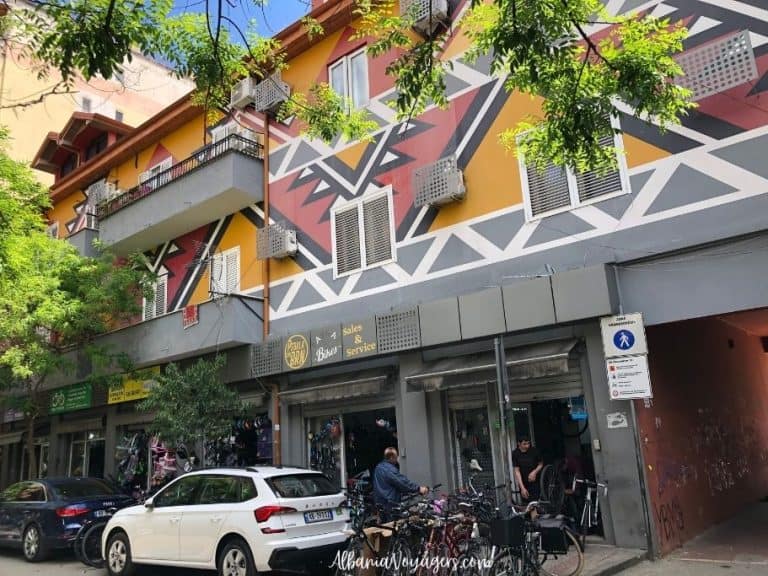What to Do in Tirana: 26 Things to See & Experience (2026)

One of the things I really like about Tirana is its compact size. Some visitors complain there isn’t a lot of things to do in Tirana, but that is precisely what I like about it.
For the record, there are quite a few things to see and do, but it’s not overwhelming. You can see Tirana in a few days at a leisurely pace and feel like you’ve covered it properly.
This is one of the main reasons I think Tirana is worth visiting.
What to Do in Tirana
If you’re wondering what you can realistically see in two full days, see my 2 day itinerary for Tirana.
If you have more time, my 5 days in Tirana guide will help you dive deeper into its culture, food, and neighbourhoods.
Practically all the sites, except for a couple, are in the centre. Here’s what to do in Tirana:
1. Skanderbeg Square
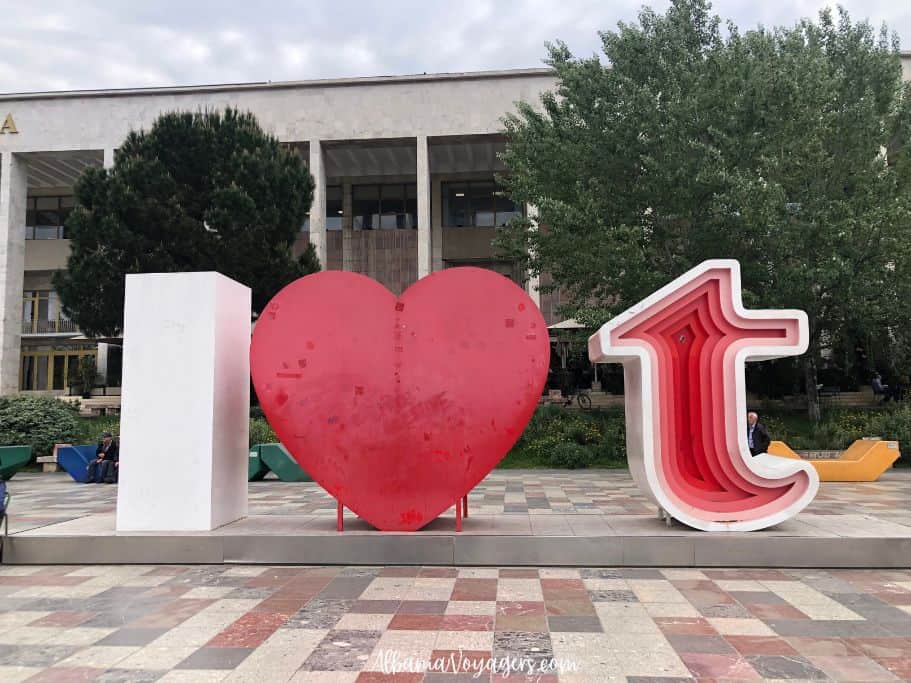
Skanderbeg Square is the perfect place to start your Tirana exploration. It’s the largest square in Tirana, and right in the centre.
The square is named after the national hero Skanderbeg who overthrew Ottoman rule of Albania in 1444. There’s a massive statue of him there.
Several of Tirana’s most popular sites are in Skanderbeg Square, National Historical Museum, Et’hem Bey Mosque and the Clock Tower.
There’s a few restaurants overlooking the square in front of the National Theater of Opera and Ballet. I had a nice breakfast and people watched at L’Incontro Cafe.
2. Et’hem Bey Mosque
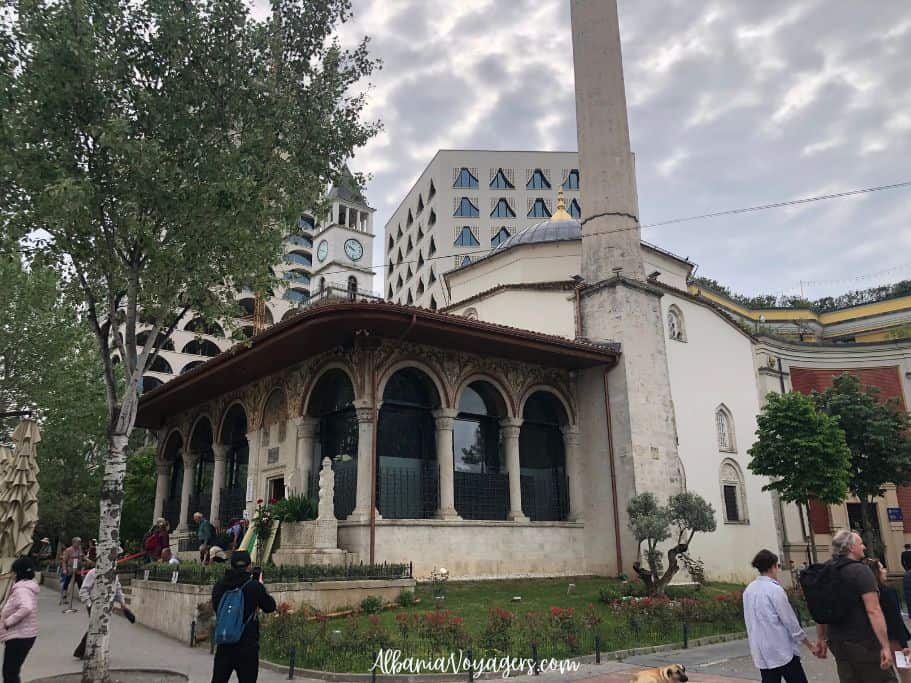
Until Namazgah Mosque opened in 2024, this was the main mosque in Tirana. It was built in 1819, but closed during the communist regime.
The mosque was built by Molla Bey, a religious leader. It’s a pretty mosque, but obviously too small to hold the Muslim faithful of Tirana. Many had to offer their prayers outside in Skanderbeg Square.
As the communist regime fell in 1991, protesters illegally entered the mosque, which sparked the movement of religious freedom in Albania. The mosque was restored in 2018.
3. Clock Tower
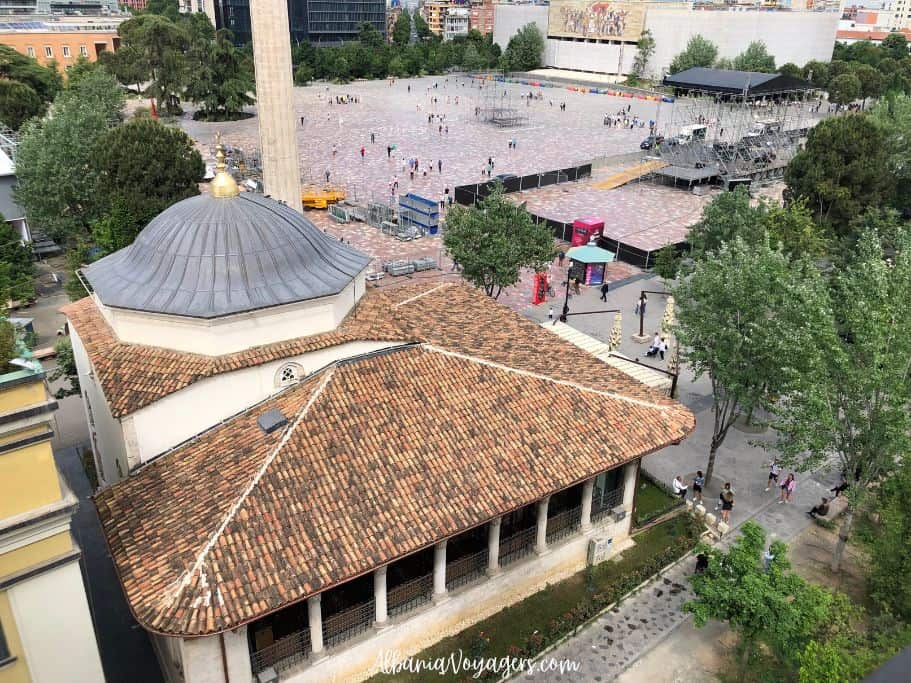
The clock tower was built by Molla Bey (who built Et’hem Bey Mosque) in 1830.
It’s obviously been restored because it looks a lot newer, but it’s worth going up because there are great views of central Tirana and Skanderbeg Square.
It’s 97 stairs to the top. Try to go early before it gets busy because the stairs are narrow – only 1 person can pass at a time, and the open balcony at the top is also tight.
4. National Historical Museum

The National Historical Museum is closed for renovations until 2028.
But, you can still view the iconic mural, the Albanians, on the facade of the museum. It’s recognized as a fine example of Socialist Realism art.
The museum is right in Skanderbeg Square, and you’ll probably end up walking past it a few times.
⚠️ The new National Gallery of Arts is under construction, and the Archeological Museum is currently closed. If you’re interested in seeing either, I recommend checking with Tourist Information in Skanderbeg Square for current status.
5. Resurrection of Christ Orthodox Cathedral

I just happened to visit this church on a Sunday morning during service. While it is a lovely church, what struck me more than anything was the beautiful choral singing.
There were two choirs at opposite sides of the altar, one female and one male. It was like listening to a classical music recording. It was that good.
The cathedral was built in 2011, and has beautiful religious murals including a large central dome with Christ (the Pantocrater). For views of the whole church, go up into the balconies.
Service times can change depending on the season, but I was there at 8:30 a.m. and it was in full swing.
6. Memorial to Communist Isolation (Checkpoint)

Checkpoint park definitely fits in with the quirky side of Tirana. Officially called the Memorial to Communist Isolation, it looks like an ordinary city park until you notice the unusual ‘monuments.’
I’d heard this park had a section of the Berlin wall, and I went to see it. But it also has a couple of communist era bunkers and concrete ribs that formed part of the mine support in Spac, a forced labour camp. Political prisoners were held in Spac until as late as 1990.
It’s a stark reminder of Albania’s dark and authoritarian past.
7. The Pyramid
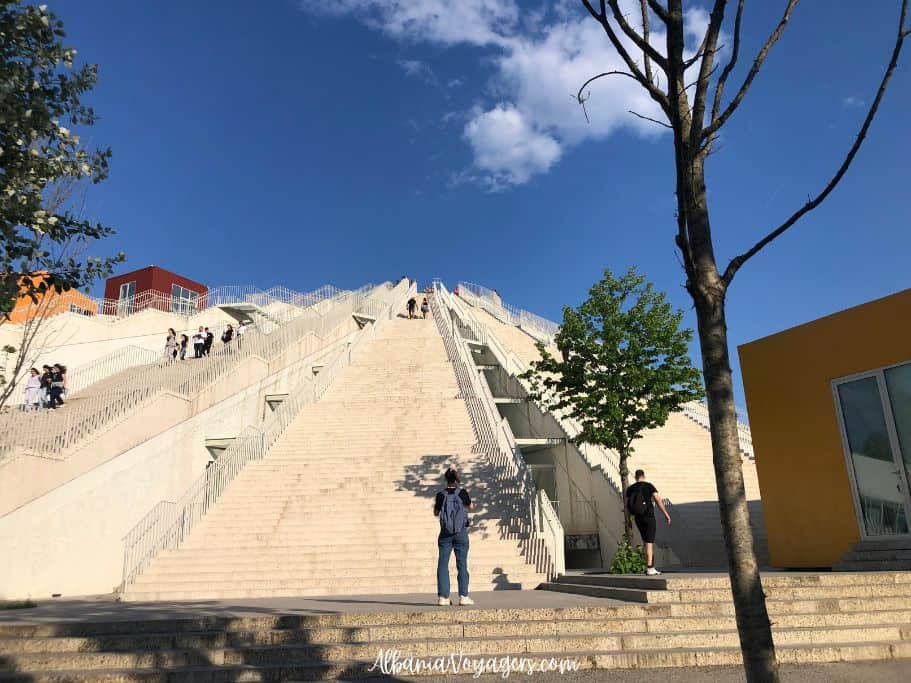
The Pyramid is one of the most iconic symbols of the fall of communism in Albania.
Originally built during the Communist regime as a mausoleum for the former dictator Enver Hoxha, the structure fell into ruin after the collapse of communism in 1991.
Since then it’s been used as a radio station, nightclub, cultural centre and a base for NATO during the war in Kosovo. Skateboarding down the slopes was a popular sport. There was talk of demolition, but it was decided to redesign and renew the space.
Today it is a cultural IT hub, with small businesses and cafes in the colourful boxes around the Pyramid.
You can also access the top of the Pyramid from inside – there’s a circular walkway. My knees were done after climbing the exterior stairs, so I didn’t do this, but it looked interesting.
8. Bunk’Art 2
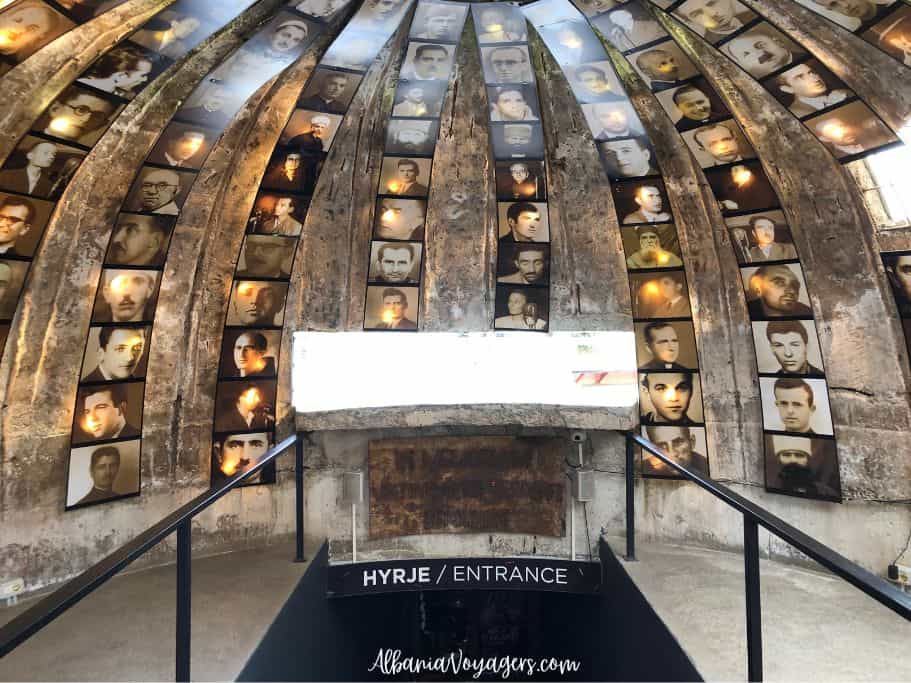
Bunk’art 2 is a former bunker used by the Ministry of Internal Affairs. It’s a now fascinating, but sobering museum about the crimes against humanity conducted by the regime.
This is fairly recent history for Albanians. The communist regime didn’t collapse until 1991. There was no freedom of the press, personal property or civil liberties. Many people who spent decades working in forced labour camps are still alive today.
9. Namazgah Mosque

This is a beautiful mosque and I highly recommend you visit. It reminded me of the gorgeous mosques I’ve seen in Istanbul.
The mosque is designed in classical Ottoman style with four minarets. Women must cover their heads (there are scarves you can borrow), and shoes have to be removed.
Albania is a predominantly Islamic country, but all religion was forbidden during the authoritarian communist regime. When communism fell in 1991, Tirana only had 8 mosques left, and tiny Et’hem Bey Mosque was the largest.
Namazgah mosque opened in 2024 after 10 years of construction. It’s now the largest mosque in the Balkans.
10. House of Leaves

House of Leaves is a museum about the control and surveillance of the Albanian people from 1946 to 1991.
It’s very well done, and will give you an understanding of the repression Albanians lived under during the communist dictatorship.
What struck me was that many of the same tactics were used in Nazi Germany, but in Albania this went on until 1991.
I went through the museum in just over an hour, it’s not big. House of Leaves is closed Mondays.
11. Enver Hoxha’s House
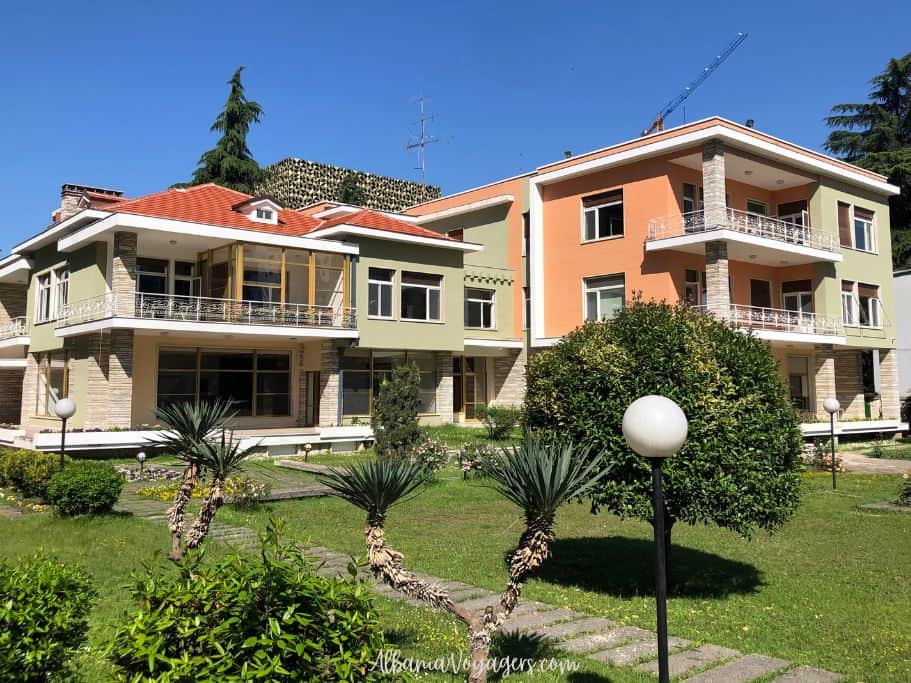
Enver Hoxha is the former dictator of Albania. The house is closed to the general public, but you can easily view it from the street. The fence is small, and the home has huge windows you can see right into.
I was surprised by how modest the home is and at the lack of security. But then I remembered that until 1991 the general public were not allowed to enter this neighbourhood, called Blloku.
Blloku was reserved for the communist elite, and it was closely guarded by armed militia.
12. Tanners’ Bridge
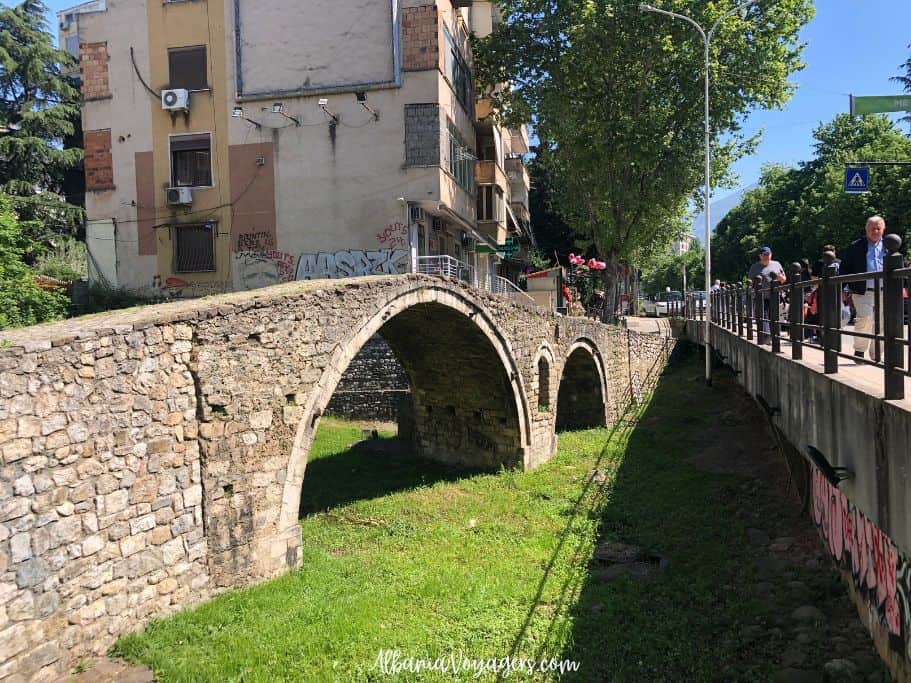
Tanners Bridge is an 18th century Ottoman bridge in the middle of Tirana. People still use it as shortcut at the busy intersection. It was once part of the main road used as an entry and exit to Tirana.
I’ve seen some spectacular arched bridges throughout the Balkans, so this was a little underwhelming – but it’s free and central, so worth a look and a walk over.
13. Tirana Castle
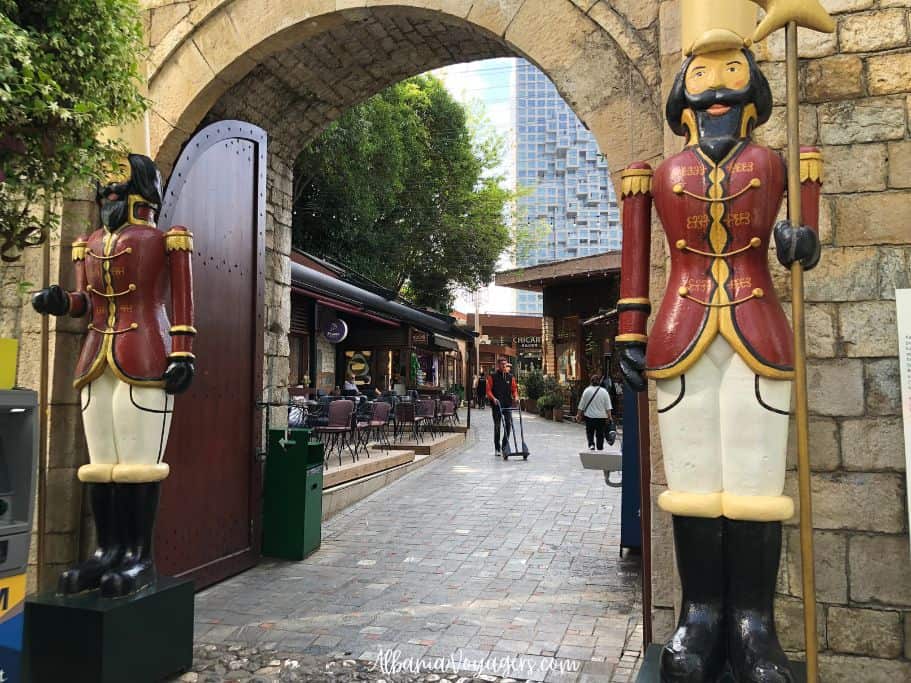
There is very little of the original 12th century castle left, just parts of the fortification wall. It’s located at the old centre of the city, where the North-South and East-West roads met.
Today Tirana Castle is a lane of restaurants, cafes and souvenir shops. I thought the fortified wall was more interesting than the tourist traps inside, but that’s just me.
It is kind of quaint (I guess) and probably nice for a coffee or drink in the evening.
14. Pazari i Ri
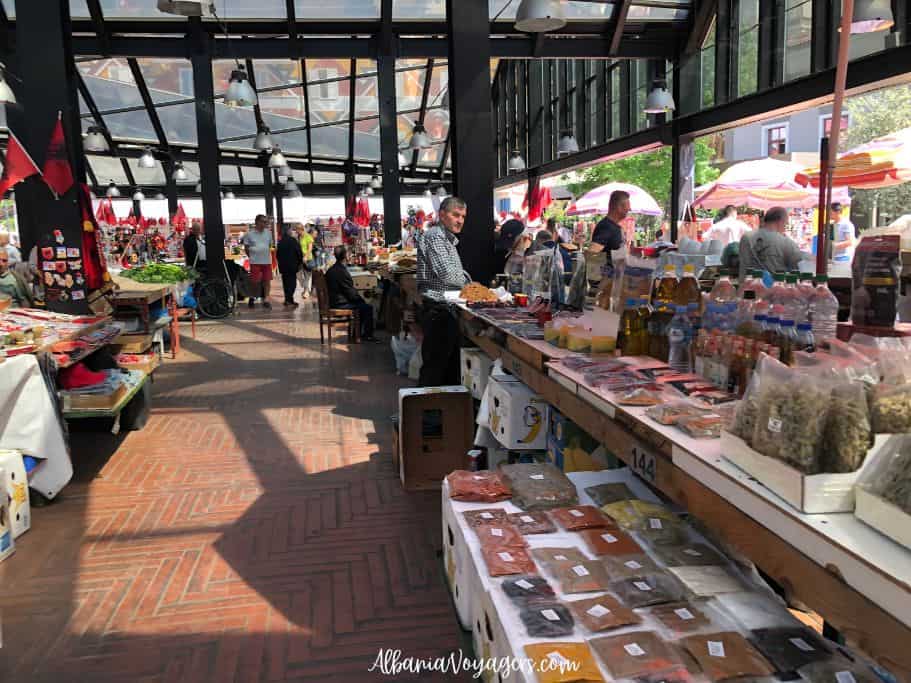
Pazari i Ri is the main market of Tirana. I was expecting it to be mainly produce and homegrown items, but there were more souvenir and flea market stalls.
The main section is covered and surrounded by coffee shops and restaurants. There’s a separate area for meat, and a few produce shops on the periphery.
This is a good spot to shop for local food items like honey, mountain tea and olives.
Some of Tirana’s best places to eat are beside the market: Oda Restaurant, Te Met Kodra and Oda’s Garden.
15. St. Paul’s Cathedral (Mother Teresa Church)

St. Paul’s Cathedral is the largest Catholic church in Tirana. Sometimes known as Mother Teresa Church (her family was Albanian), there is statue of the saint outside the church and a mosaic of her near the altar.
Like many religious buildings in Tirana, this one is newer (built in 2002), but it does have some nice stained glass windows.
Shortly after my visit here I ran into two nuns from the same order as Mother Teresa – easily identified by their white with blue stripe saris.
16. Shtepite Studio Kadare-Agolli
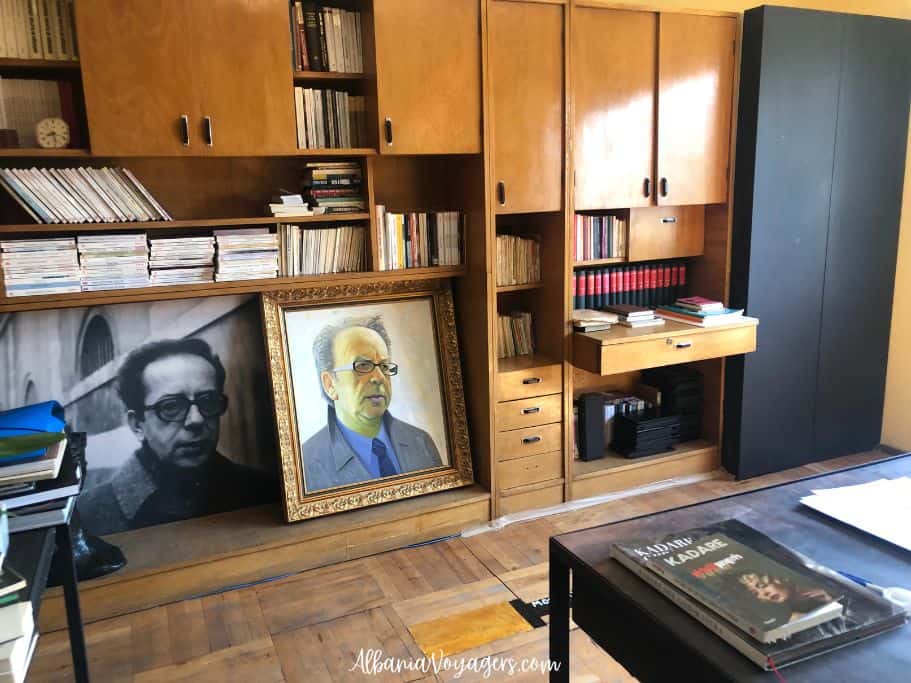
These are the former apartments of Albania’s most famous writers, Ismail Kadare and Dritero Agolli. Both writers lived in the same building for decades and wrote their most influential works there.
The apartments have been converted into museums, and they do have some original items and furnishings, but much has been changed. I would have enjoyed it more if the apartments were left in their original state. But it was still interesting.
The building itself is also known. It’s the one with the huge bookcase mural, and the architect ended up in a labour camp for 8 years over its ‘Western influenced’ design.
The entrance is the small residential door on the side. Closed on Mondays.
17. Reja (the Cloud)

Reja, or the Cloud, as it is commonly called in Tirana, is a public art work by the famous Japanese architect Sou Fujimoto.
It is an interactive art piece, meant to be climbed and explored by visitors from the inside or the outside. I was too tired to climb it myself when I saw it, but there was a little girl happily giving it a go.
If you run out of things to do in Tirana, consider taking a day trip to Kruja. It’s easy to do on your own, and only one hour from Tirana!
18. Grand Park (Tirana Park)

Situated on the south side of Tirana, not far from the Blloku neighbourhood is Tirana’s green oasis, Grand Park (aka Tirana Park).
The park is big – over 700 acres. It’s got hiking and walking paths, cafes, playgrounds, gardens, public art, and a big lake with ducks.
Tirana Park is really nice, and I just wish I would have picked an Airbnb closer to it because Watson loved walking there.
19. Rruga Zela Street Market
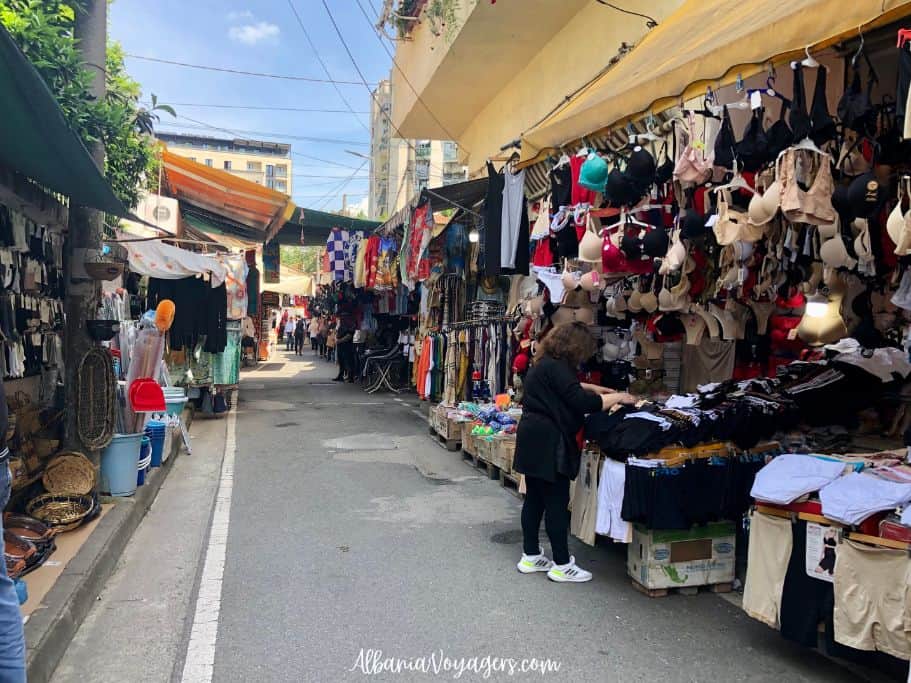
This street market is very popular with locals. It’s a great place to pick up basic things like socks, t-shirts, and fridge magnets at bargain prices. It takes up most of the side street called Rruga Zela.
I discovered this place completely by chance, walking back to my Airbnb. Only 10 minutes before this, a tourist had stopped to ask me about street shopping – I think she was looking for this place!
20. Former Airfield Park

This used to be the runway of the former national airport. Today it is a pedestrian thoroughfare, with playgrounds, produce stands, cafes and restaurants.
The airfield converted to a military operation in the 1960s, but was abandoned in 2005 as the city of Tirana grew and surrounded it.
It’s not as picturesque as the Castle, but it’s an authentic slice of every day Tirana life. I walked Watson here when I was staying in Tirana as a digital nomad.
21. Enjoy the Coffee Culture
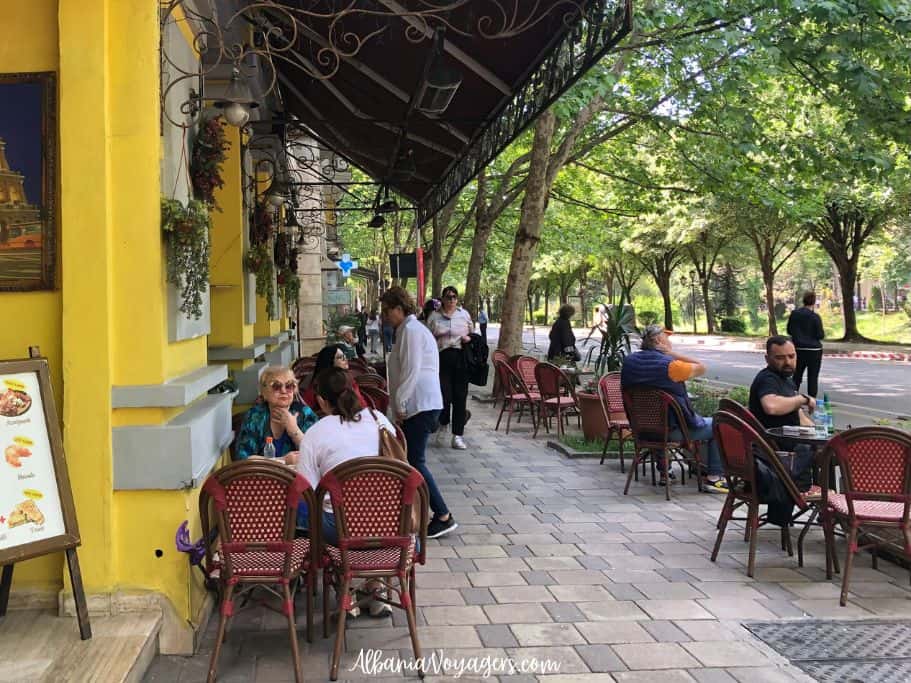
There are hundreds of little coffee shops in Tirana. It’s impossible to walk more than 2 blocks without seeing one!
Albanians love to sit outdoors and enjoy a leisurely coffee, usually a thick and strong Turkish style coffee!
22. Bektashi Order Headquarters

I had never heard of this Sufi order until coming to Tirana. It originated in Turkey but was banned in 1923, so it moved to Albania.
The Bektashi Order want this site to become a sovereign state, like the Vatican. If granted, it would be the smallest sovereign state in the world.
The main building (tekke) was closed when I was there, but I looked through the windows and it’s stunning. I was able to walk the grounds and enter the smaller buildings, which were pretty.
To get there, I took the no. 5 bus from Rinia Park. It stopped 5 minutes from the centre. Government issued ID is required to enter.
23. Dajti Ekspres
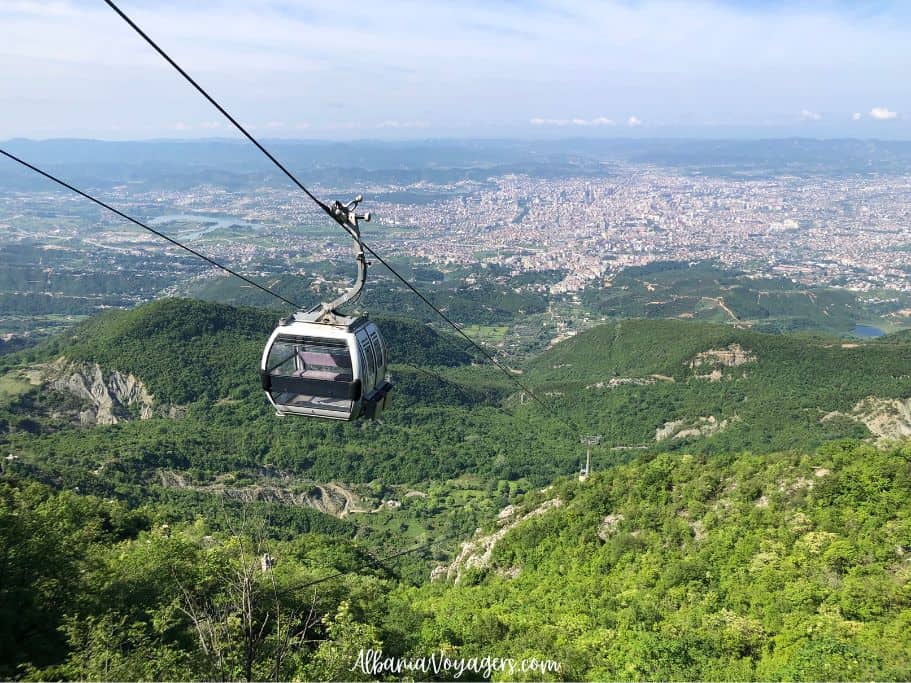
Dajti Ekspres is the longest cable car ride in the Balkans. The views of Tirana and Dajti Mountain National Park are beautiful. I got a cable car to myself and it was so peaceful, all I could hear were birds and roosters.
Once at the top there’s a park, playground, mini-golf and a nice restaurant called Ballkoni Dajtit with great views of the mountain and Tirana.
There’s a rooftop restaurant at the hotel, but I was told it’s closed permanently. Things change here all the time, so you can check when you go.
To get to Dajti Ekspres, take the blue bus no. 11 Porcelan. The bus stop is in front of the Friendship Monument on Rruga Luigi Gurakuqi.
You have to get off the bus just past the big roundabout that goes over the highway, and walk 900 metres uphill to the Dajti cable car station.
After Dajti Ekspres go see Bunk’Art 1. It’s only a 5 minute walk. Dajti Ekspres is closed Tuesdays.
24. Bunk’Art 1
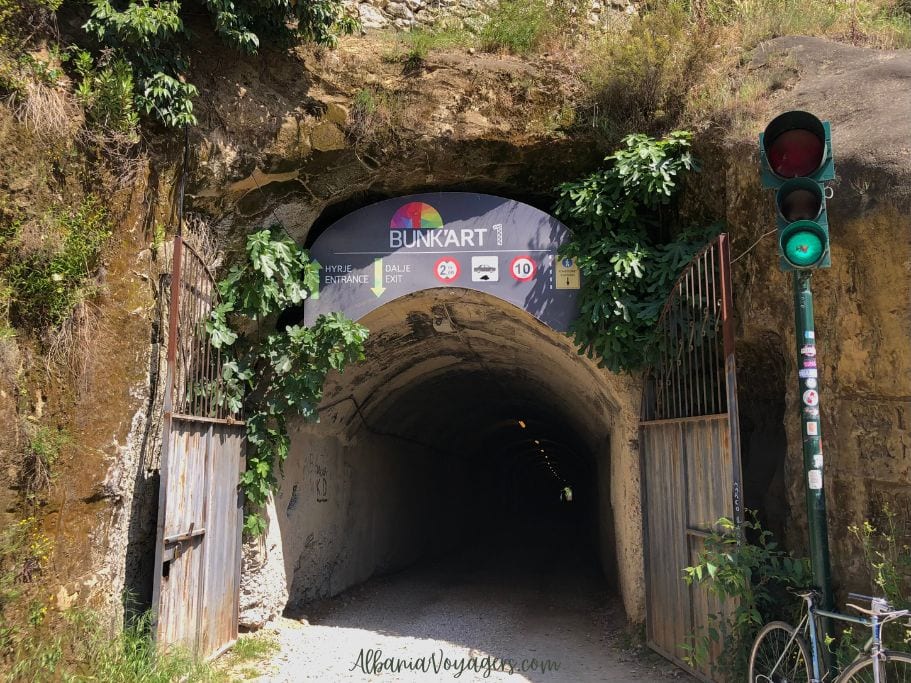
Bunk’Art 1 is the former personal bunker of communist dictator Enver Hoxha. Hoxha was paranoid about attacks from other countries and had 175,000 bunkers built all over Albania.
It’s very different from Bunk’Art 2. It’s much larger, out of the city centre and there’s a lot more walking. It was built to house Hoxha, his wife, the prime minister and key government officials.
I went on the weekend of the Giro d’Italia and a big EU summit. There were a few tour groups and it felt a bit claustrophobic. The bunker tunnels are single file, and it’s not fun if you get stuck behind a big group. Try to go when you’re less likely to run into tours.
To get to Bunk’Art 1, take the blue bus, no 11 Porcelan – the same as for Dajti Ekspres. Bunk’Art 1 is just down the road from Dajti Ekspres.
25. Visit Mother Mother Teresa Street (Rruga Hajdar Hidi)
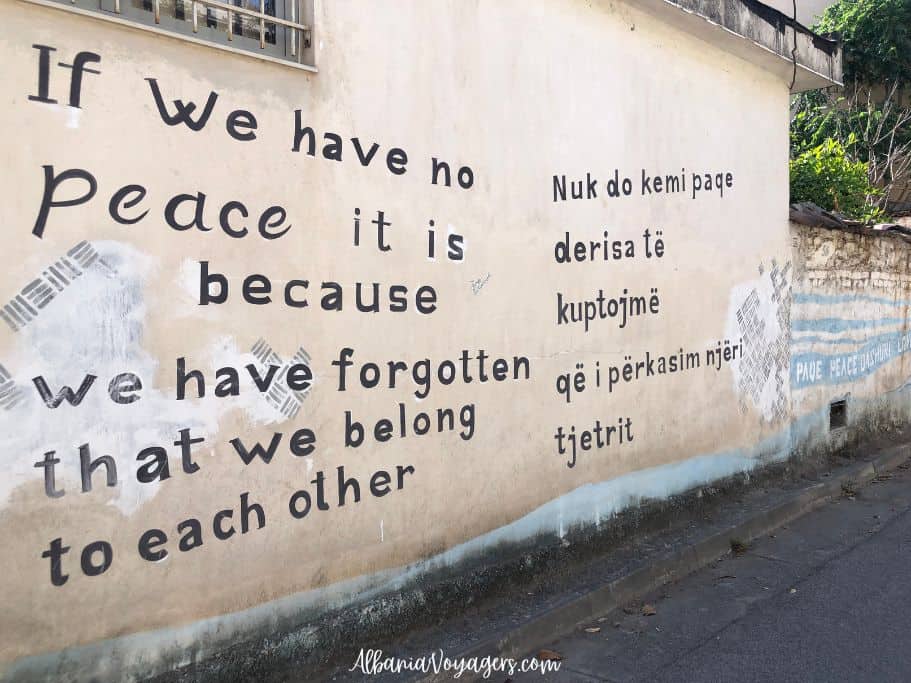
Mother Teresa was Albanian, and her mother and sister lived in Tirana for many years on Rruga Hajdar Hidi.
I’ve stayed on the same street as the house where they lived and walked past it many times. It’s a modest white building with a photograph and plaque. Unfortunately, it’s always been closed when I’ve gone by.
But the street is kind of cool even if you can’t get inside the house. There’s quite a few murals dedicated to Mother Teresa and the Rruga Zela market is on the next street over, so see them both at the same time.
26. Free Walking Tour

A free walking tour is a great way to get acclimated to a new place.
I booked the Tirana free walking tour through GuruWalk, but I think all the free walking tours link back to the same Tirana tour company.
It was a good, general tour (2 hours) that covered all the main sites, and gave us a brief history of Albania. One of the best things about these tours is that you can ask questions and get insider tips.
Our guide told us that the ‘Face’ building is actually the face of the national hero, Skanderbeg, and the protruding blocks in Tirana Tower are in the shape of the map of Albania!
For the record, a free walking tour is not free. You pay what you think it is worth.
27. Take in the Views From an Elevated Restaurant or Lounge
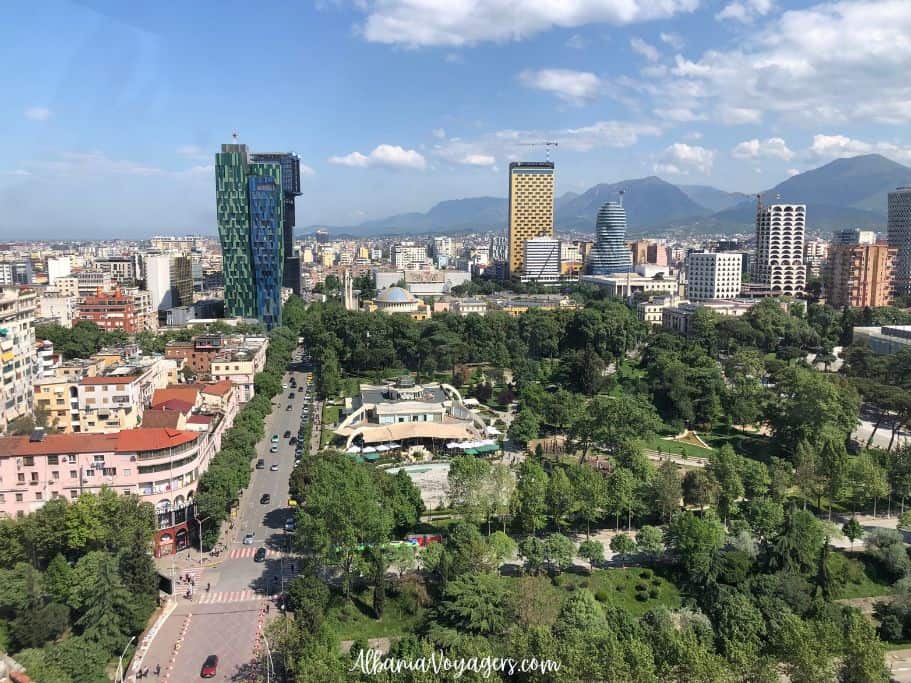
Relaxing with a coffee or glass of wine is kind of nice sometimes, especially after walking for hours seeing the sites. These restaurants have great views of Tirana:
- Sky Restorant and Sky Club 360° at the Sky Hotel: I really liked the outdoor terrace, especially since it felt like a cafe you could just order a cappuccino in. The club is one floor up on the roof and rotates a full 360° for panoramic views of Tirana.
- LIFT: an upscale restaurant on the 4th floor roof of the ABA Business Centre. Kind of expensive, but breakfast and the set business lunch are more reasonable. Views are good and there’s a large outdoor terrace.
- The View Lounge at Maritim Hotel Plaza Tirana: I loved the vibe of this piano lounge with great views of the city centre. It’s on the 23rd floor, but there’s no outdoor terrace. Definitely more of a cocktail place.
Wondering where to stay in Tirana?
These are some of my favourite hotels in Tirana:
Maritim Hotel Plaza Tirana: exceptional 5 star hotel right beside Skanderbeg Square
Central Inn Hotel: boutique hotel, very central and newly renovated
Bujtina e Gjelit: charming hotel, very Albanian but not as central
Click here to see all the best places to stay in Tirana
Last Words on What to Do in Tirana
Now that you know what there is to do in Tirana, come visit this quirky European capital city.
It’s the perfect getaway for a few days. There’s enough things to do to keep you busy, but not so much that you’ll leave and feel like you missed half of it. Plus you can walk almost everywhere, the main sites are very central.
Want itinerary ideas? Here’s how I fit Tirana into two different 5 days in Albania routes.

